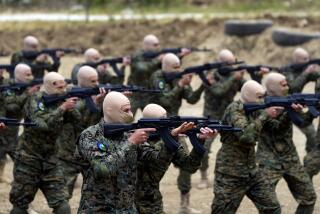Iran Worst Terror Sponsor in ‘97, State Dept. Says
- Share via
WASHINGTON — Despite the election of a more moderate government last year, Iran remains the world’s worst sponsor of international terrorism, carrying out 13 assassinations in 1997, the State Department reported Thursday.
The assessment, included in the department’s annual survey of terrorism, is expected to trouble members of Congress, upset Iranian leaders and hamper attempts by both Washington and Tehran to ease their tense and antagonistic relations.
“Although the August 1997 accession of President [Mohammad] Khatami has resulted in more conciliatory Iranian public statements . . . Iranian support for terrorism remains in place,” the State Department said.
Most of the 13 assassinations last year occurred in northern Iraq, and included members of the People’s Moujahedeen, an Iranian opposition group headquartered in Baghdad, and members of the opposition Kurdish Democratic Party of Iran.
Last year’s State Department report also named Iran as the worst offender and blamed it for eight assassinations in 1996.
Worldwide, the department found this year, there was a general decline in terrorism in 1997, as terrorist killings fell from 314 in 1996 to 221 last year. The number of people wounded by terrorist acts declined from 2,912 to 693. American casualties from international terrorism declined from 23 dead and 510 wounded in 1996 to seven dead and 21 wounded in 1997.
Incidents of international terrorism also declined in 1997 to 307, one of the lowest totals since U.S. officials began keeping such statistics in 1991.
In another hopeful development, the department said that more terrorists are being arrested and tried for their crimes.
Despite these statistics, the agency concluded: “International terrorism remains a serious, ongoing threat around the world. Individual bombings and armed attacks, while fewer in number than last year, continue to cause horrendous casualties.”
The states that support terrorism are Cuba, Iraq, Libya, North Korea, Sudan and Syria, in addition to Iran, according to the report, which Congress requires the State Department to produce.
Cuba was included even though U.S. officials concluded that it “no longer supports armed struggle in Latin America and other parts of the world.” Cuba remained on the list because it has given haven to terrorists, the report said. Cuba itself was hit by a series of bombings that targeted tourism in 1997, resulting in the death of an Italian tourist.
Although a Salvadoran confessed to planting the bombs, Cuba has accused U.S.-based groups with ties to Cuban exiles of directing the bombing campaign. But the State Department insisted that Cuba “has repeatedly ignored U.S. requests for evidence to support these charges.”
In its discussion of Iran, the State Department noted favorably that the Islamic Republic had condemned the terrorist attack on tourists at Luxor, Egypt, in November and that Khatami, in a January interview on Cable News Network, had agreed that terrorist attacks on Israeli women and children should be condemned.
Still, the department said, Iran carried out assassinations against Iranian opponents abroad and maintained the fatwa, a religious decree, to kill Indian-born British author Salman Rushdie for allegedly insulting Islam in a novel. Tehran used government money, the report said, to support terrorist groups such as Hezbollah in Lebanon; Islamic Jihad and Hamas in the Israeli-occupied territories and the Palestinian autonomous areas; and Gamaa al Islamiya in Egypt.
After the election of Khatami and his conciliatory words in the CNN interview, the Clinton administration explored ways to open lines to the Iranian government. But administration officials have said that relations cannot be restored until Iran abandons terrorism. The public branding of Iran as the world’s worst terrorist sponsor clearly makes American overtures to Iran even more difficult.
The report said Colombia was the site of 107 international terrorist incidents in 1997, the largest number in the world. But most were oil pipeline bombings, carried out by rebel groups against foreign companies.
Algeria, which has suffered more than 70,000 deaths since 1992, was clearly the site of the world’s worst violence. But almost all the killings were of Algerians by Algerians, and, as such, were considered internal violence that is not covered by the department survey.
In all, the report said, seven foreigners were killed by terrorists in Algeria in 1997.
More to Read
Sign up for Essential California
The most important California stories and recommendations in your inbox every morning.
You may occasionally receive promotional content from the Los Angeles Times.










